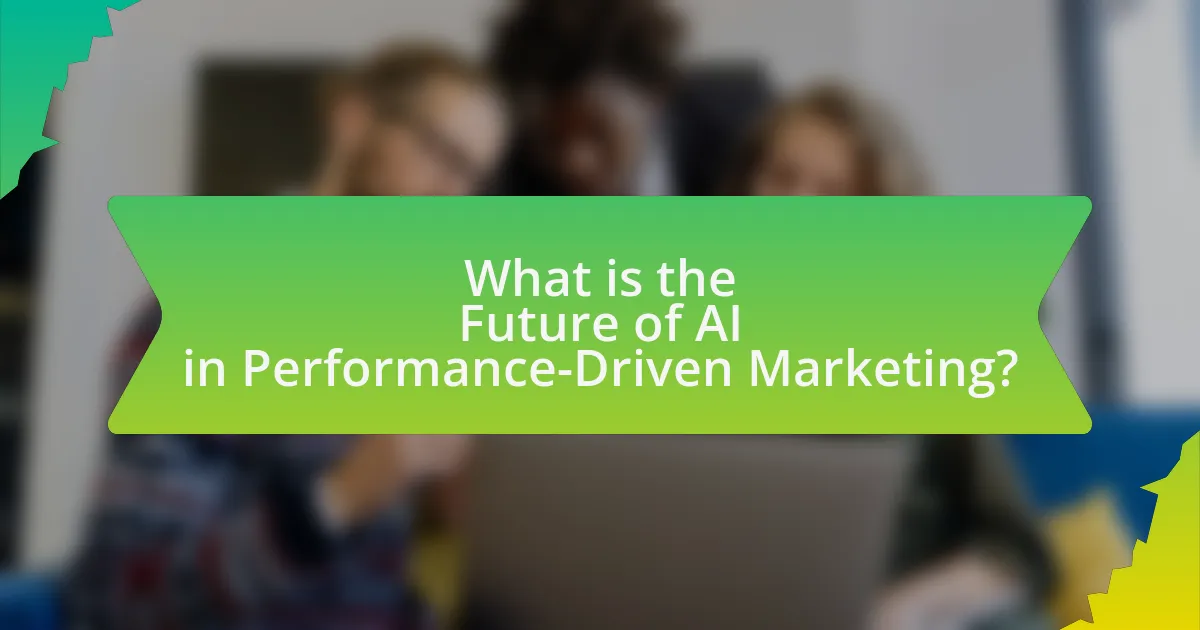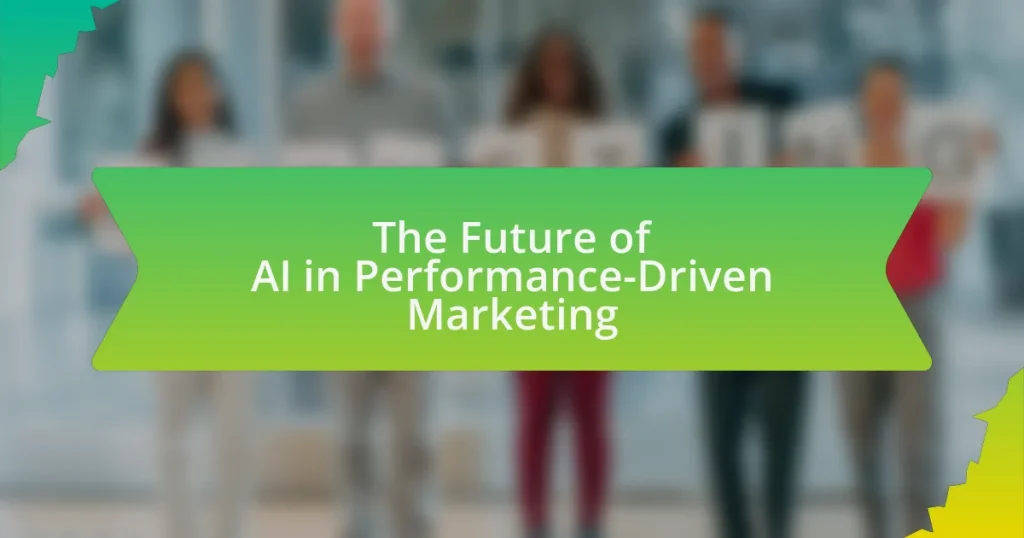The article focuses on the future of artificial intelligence (AI) in performance-driven marketing, highlighting its role in enhancing personalization, predictive analytics, and automation. It discusses how AI technologies enable marketers to analyze large datasets to tailor campaigns, optimize ad spend, and improve return on investment (ROI). Key technologies such as machine learning and natural language processing are examined for their impact on customer targeting and segmentation. The article also addresses challenges like data privacy and algorithmic bias, while emphasizing the importance of ethical considerations and best practices for integrating AI into marketing strategies.

What is the Future of AI in Performance-Driven Marketing?
The future of AI in performance-driven marketing is characterized by enhanced personalization, predictive analytics, and automation. AI technologies will enable marketers to analyze vast amounts of data to tailor campaigns to individual consumer preferences, thereby increasing engagement and conversion rates. For instance, according to a report by McKinsey, companies that leverage AI for personalization can see a 10-30% increase in revenue. Furthermore, AI-driven predictive analytics will allow marketers to anticipate consumer behavior, optimizing ad spend and improving ROI. Automation tools powered by AI will streamline marketing processes, enabling real-time adjustments to campaigns based on performance metrics. This evolution signifies a shift towards more data-driven, efficient, and effective marketing strategies.
How is AI transforming performance-driven marketing strategies?
AI is transforming performance-driven marketing strategies by enabling data-driven decision-making and personalized customer experiences. Through advanced algorithms and machine learning, AI analyzes vast amounts of consumer data to identify patterns and predict behaviors, allowing marketers to tailor campaigns effectively. For instance, a study by McKinsey found that companies using AI in marketing can increase their marketing ROI by 15-20%. Additionally, AI-powered tools optimize ad placements in real-time, ensuring that marketing budgets are spent efficiently and targeting the right audience at the right time. This shift towards automation and precision in marketing strategies enhances overall performance and drives better results.
What are the key technologies driving AI in marketing?
Key technologies driving AI in marketing include machine learning, natural language processing, and data analytics. Machine learning algorithms enable marketers to analyze consumer behavior and predict trends, enhancing targeting and personalization. Natural language processing allows for improved customer interactions through chatbots and sentiment analysis, facilitating better engagement. Data analytics provides insights into campaign performance and customer preferences, enabling data-driven decision-making. These technologies collectively enhance marketing efficiency and effectiveness, as evidenced by a report from McKinsey, which states that companies leveraging AI in marketing can increase their marketing ROI by up to 30%.
How does AI enhance data analysis in marketing campaigns?
AI enhances data analysis in marketing campaigns by automating data collection and providing predictive analytics. This automation allows marketers to process vast amounts of data quickly, identifying trends and consumer behaviors that inform campaign strategies. For instance, AI algorithms can analyze customer interactions across multiple channels, enabling targeted marketing efforts that increase engagement and conversion rates. According to a report by McKinsey, companies that leverage AI in their marketing strategies can achieve up to a 20% increase in sales. This demonstrates the effectiveness of AI in optimizing marketing performance through data-driven insights.
Why is performance-driven marketing important in the context of AI?
Performance-driven marketing is crucial in the context of AI because it enables businesses to leverage data analytics for optimizing marketing strategies and maximizing return on investment. AI technologies can analyze vast amounts of consumer data in real-time, allowing marketers to identify trends, personalize campaigns, and allocate resources more effectively. For instance, a study by McKinsey found that companies using AI in marketing can increase their marketing ROI by 20% to 30%. This data-driven approach not only enhances targeting precision but also improves customer engagement, making performance-driven marketing a key component in the successful integration of AI into marketing practices.
What metrics are most affected by AI in performance-driven marketing?
The metrics most affected by AI in performance-driven marketing include conversion rates, customer acquisition cost, return on ad spend, and customer lifetime value. AI enhances conversion rates by optimizing targeting and personalizing content, leading to higher engagement and sales. It reduces customer acquisition costs through improved audience segmentation and predictive analytics, allowing marketers to focus on high-potential leads. Additionally, AI increases return on ad spend by automating bidding strategies and optimizing ad placements in real-time, ensuring that marketing budgets are spent efficiently. Finally, AI contributes to a more accurate calculation of customer lifetime value by analyzing customer behavior and predicting future purchasing patterns, enabling businesses to tailor their marketing strategies effectively.
How does AI improve customer targeting and segmentation?
AI improves customer targeting and segmentation by analyzing vast amounts of data to identify patterns and preferences among consumers. This capability allows businesses to create highly personalized marketing strategies that resonate with specific audience segments. For instance, AI algorithms can process demographic information, purchasing behavior, and online interactions to segment customers more accurately than traditional methods. According to a study by McKinsey, companies that leverage AI for customer segmentation can achieve up to a 10-20% increase in marketing effectiveness, demonstrating the tangible benefits of AI-driven insights in enhancing targeting precision.
What challenges does the future of AI in performance-driven marketing face?
The future of AI in performance-driven marketing faces challenges such as data privacy concerns, algorithmic bias, and the need for transparency. Data privacy regulations like GDPR impose strict guidelines on how consumer data can be used, limiting the effectiveness of AI-driven marketing strategies. Algorithmic bias can lead to unfair targeting and misrepresentation, which can damage brand reputation and consumer trust. Additionally, the lack of transparency in AI decision-making processes makes it difficult for marketers to understand how AI models arrive at their conclusions, complicating the optimization of marketing campaigns. These challenges highlight the need for ethical considerations and robust frameworks to guide the integration of AI in marketing practices.
What ethical considerations arise with AI in marketing?
Ethical considerations that arise with AI in marketing include data privacy, algorithmic bias, and transparency. Data privacy concerns stem from the collection and use of personal information without explicit consent, which can lead to violations of regulations like GDPR. Algorithmic bias occurs when AI systems perpetuate existing stereotypes or discrimination, impacting marginalized groups negatively. Transparency is crucial, as consumers need to understand how AI influences marketing decisions and the data used, fostering trust and accountability. These considerations highlight the need for ethical frameworks to guide AI deployment in marketing practices.
How can businesses overcome the barriers to AI adoption in marketing?
Businesses can overcome the barriers to AI adoption in marketing by investing in employee training and fostering a culture of innovation. Training equips employees with the necessary skills to utilize AI tools effectively, addressing the knowledge gap that often hinders adoption. According to a McKinsey report, organizations that prioritize training in AI technologies see a 20% increase in productivity. Additionally, creating an environment that encourages experimentation with AI can lead to innovative marketing strategies, as evidenced by companies like Unilever, which successfully integrated AI into their marketing processes, resulting in improved customer engagement and sales.
How can businesses prepare for the future of AI in performance-driven marketing?
Businesses can prepare for the future of AI in performance-driven marketing by investing in data analytics and machine learning technologies. These technologies enable businesses to analyze consumer behavior and preferences, allowing for more targeted marketing strategies. According to a report by McKinsey, companies that leverage AI in marketing can increase their marketing ROI by 10-20%. Additionally, businesses should focus on building a skilled workforce proficient in AI tools and techniques, as a study by PwC indicates that 54% of executives believe AI will significantly change their marketing strategies in the next five years. By adopting these measures, businesses can enhance their marketing effectiveness and stay competitive in an evolving landscape.
What are the emerging trends in AI for performance-driven marketing?
Emerging trends in AI for performance-driven marketing include hyper-personalization, predictive analytics, and automation of marketing processes. Hyper-personalization leverages AI algorithms to analyze consumer behavior and preferences, enabling brands to deliver tailored content and offers, which can increase engagement rates by up to 50%. Predictive analytics utilizes machine learning models to forecast customer behavior and optimize marketing strategies, leading to improved ROI; for instance, companies using predictive analytics have reported a 20% increase in sales. Additionally, automation tools powered by AI streamline campaign management and customer interactions, reducing operational costs by approximately 30% while enhancing efficiency. These trends demonstrate the transformative impact of AI on marketing effectiveness and customer engagement.
How is personalization evolving with AI technologies?
Personalization is evolving with AI technologies through advanced data analytics and machine learning algorithms that enable more tailored customer experiences. AI systems analyze vast amounts of consumer data, including behavior patterns and preferences, to create individualized marketing strategies. For instance, according to a report by McKinsey, companies that leverage AI for personalization can achieve up to a 10-20% increase in sales. This evolution allows businesses to deliver relevant content and product recommendations in real-time, enhancing customer engagement and satisfaction.
What role does machine learning play in optimizing marketing performance?
Machine learning plays a crucial role in optimizing marketing performance by enabling data-driven decision-making and personalized customer experiences. By analyzing vast amounts of consumer data, machine learning algorithms can identify patterns and trends that inform marketing strategies, leading to more effective targeting and segmentation. For instance, a study by McKinsey found that companies using advanced analytics, including machine learning, can improve their marketing ROI by 15-20%. This optimization occurs through predictive analytics, which forecasts customer behavior, and real-time data analysis, allowing marketers to adjust campaigns dynamically for better results.
What best practices should marketers follow when integrating AI?
Marketers should prioritize data quality and ethical considerations when integrating AI. High-quality, relevant data ensures that AI models produce accurate insights and predictions, which is essential for effective marketing strategies. Additionally, adhering to ethical guidelines, such as transparency and fairness, helps build consumer trust and complies with regulations like GDPR. Research indicates that companies that prioritize data governance and ethical AI practices see a 20% increase in customer satisfaction and loyalty. Therefore, focusing on data integrity and ethical standards is crucial for successful AI integration in marketing.
How can marketers ensure data privacy while using AI?
Marketers can ensure data privacy while using AI by implementing robust data governance frameworks and adhering to regulations such as GDPR and CCPA. These frameworks establish clear protocols for data collection, storage, and processing, ensuring that personal information is handled responsibly. For instance, organizations can utilize techniques like data anonymization and encryption to protect sensitive information. According to a report by the International Association of Privacy Professionals, 79% of consumers are concerned about how their data is used, highlighting the importance of transparency and consent in data practices. By prioritizing these measures, marketers can build trust with consumers while leveraging AI technologies effectively.
What tools and platforms are recommended for AI-driven marketing?
Recommended tools and platforms for AI-driven marketing include HubSpot, Salesforce Einstein, Google AI, and Adobe Sensei. HubSpot offers AI-powered features for content optimization and customer segmentation, enhancing marketing efficiency. Salesforce Einstein integrates AI into customer relationship management, providing predictive analytics for targeted campaigns. Google AI facilitates data analysis and personalized advertising through machine learning algorithms. Adobe Sensei enhances creative processes by automating design and content recommendations. These platforms leverage AI to improve marketing strategies, drive engagement, and optimize performance, as evidenced by their widespread adoption in the industry.


